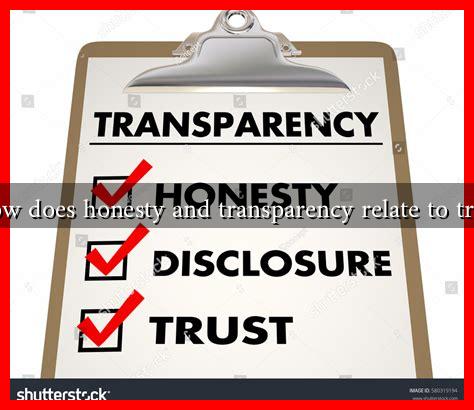-
Table of Contents
How Does Honesty and Transparency Relate to Trust?
In an increasingly interconnected world, the concepts of honesty and transparency have become pivotal in building and maintaining trust. Whether in personal relationships, business dealings, or governance, the interplay between these values shapes perceptions and influences behaviors. This article delves into how honesty and transparency relate to trust, supported by examples, case studies, and relevant statistics.
The Foundation of Trust
Trust is often described as the bedrock of any relationship, be it personal or professional. It is the belief that someone will act in your best interest, and this belief is cultivated through consistent actions and communication. Honesty and transparency are essential components of this foundation. When individuals or organizations are honest, they provide accurate information and admit mistakes, while transparency involves openly sharing information and processes.
Honesty: The Pillar of Trust
Honesty is the quality of being truthful and straightforward. It is a fundamental aspect of trust-building. Here are some key points illustrating the importance of honesty:
- Consistency in Communication: Honest communication fosters reliability. When people know they can expect the truth, they are more likely to trust the source.
- Accountability: Admitting mistakes and taking responsibility enhances credibility. For instance, when a company recalls a defective product and communicates openly about the issue, it can strengthen customer trust.
- Long-term Relationships: Honesty nurtures long-lasting relationships. A study by the American Psychological Association found that couples who practice honesty report higher levels of satisfaction and trust in their relationships.
Transparency: The Key to Openness
Transparency complements honesty by ensuring that information is accessible and clear. It involves sharing not just what is happening, but also why it is happening. Here’s how transparency contributes to trust:
- Informed Decision-Making: When organizations are transparent about their processes, stakeholders can make informed decisions. For example, companies that disclose their supply chain practices are often viewed more favorably by consumers.
- Building Credibility: Transparency can enhance an organization’s credibility. A 2020 survey by Edelman found that 81% of consumers said they need to be able to trust a brand to buy from them.
- Encouraging Engagement: Transparency invites dialogue and feedback. When leaders are open about their strategies and challenges, it fosters a culture of trust and collaboration.
Case Studies: Real-World Examples
Several organizations have successfully leveraged honesty and transparency to build trust:
- Buffer: This social media management platform is known for its radical transparency. Buffer shares its revenue, salaries, and even its mistakes publicly, which has cultivated a loyal customer base and a strong company culture.
- Johnson & Johnson: During the Tylenol crisis in the 1980s, the company’s swift and transparent response to the tampering incident—recalling products and communicating openly with the public—helped restore trust in the brand.
The Consequences of Dishonesty and Lack of Transparency
On the flip side, dishonesty and a lack of transparency can severely damage trust. The fallout can be significant:
- Loss of Reputation: Companies that engage in deceptive practices often face public backlash. For instance, the Volkswagen emissions scandal led to billions in losses and a tarnished reputation.
- Decreased Loyalty: Customers are less likely to remain loyal to brands that are not transparent. A study by Accenture found that 63% of consumers prefer to buy from companies that are open about their business practices.
Conclusion: The Interconnectedness of Honesty, Transparency, and Trust
In conclusion, honesty and transparency are not just ethical imperatives; they are essential for building and maintaining trust. Organizations and individuals that prioritize these values create environments where trust can flourish. As demonstrated through various case studies and statistics, the benefits of fostering trust through honesty and transparency are profound, leading to stronger relationships, enhanced credibility, and long-term success. In a world where trust is increasingly hard to come by, embracing these principles can set individuals and organizations apart.
For further reading on the importance of trust in business, you can explore resources from the Edelman Trust Barometer.

